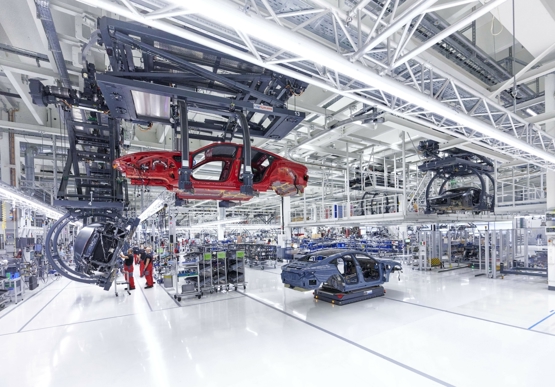Audi is preparing to switch all its factories for production of battery electric cars ahead of the final combustion-engined car coming off its assembly lines by 2033.
And it wants to halve its factory costs in the same timescale, allowing it to recoup some of the vast investment in EV development through reduced complexity and improved IT.
From 2026 the German brand will launch only all-electric new models and phase out its ICE models by 2033, and now Audi has created the ‘360factory’; a vision of the future. The approach places equal emphasis on cost-effectiveness, sustainability, flexibility, and attractiveness.
In 2029, all production sites will be producing at least one all-electric vehicle model. Two sites, Böllinger Höfe and Brussels, are already producing all-electric vehicles. Starting next year, the Audi Q6 e-tron will be the first all-electric model to roll off the production line in Ingolstadt. And production of all-electric cars will gradually start in Neckarsulm, San José Chiapa, and Győr as well.
“Step by step, we are bringing all our sites into the future,” says Audi board member for production and logistics Gerd Walker.
“We don’t want any standalone lighthouse projects on greenfield sites. Instead, we are investing in our existing plants so they end up being just as efficient and flexible as newly built production sites or greenfield plants.”
 According to Walker, this is sustainability in action – in economic, ecological, and social aspects. “The path Audi is taking conserves resources and accelerates our transformation to a provider of sustainable premium mobility,” Walker said.
According to Walker, this is sustainability in action – in economic, ecological, and social aspects. “The path Audi is taking conserves resources and accelerates our transformation to a provider of sustainable premium mobility,” Walker said.
To ensure that future production will be economical, Audi wants to cut annual factory costs in half by 2033. To achieve this, the brand plans to reduce the complexity of its vehicles where it does not benefit the customer – to this end, vehicle development will take a streamlined production process into account from stage one.
On its way to becoming a 360factory, Audi is now setting itself even more ambitious sustainability targets related to production. By 2030, the company aims to cut its absolute environmental impact in the areas of primary energy consumption, power plant emissions, CO2 equivalents, air pollutants, local water risk, and wastewater and waste volumes in half, compared with the 2018 figure.
Important steps to achieving this goal include generating renewable energy in-house and using innovative technologies to create more circular value chains where resources used are utilized in closed cycles.
